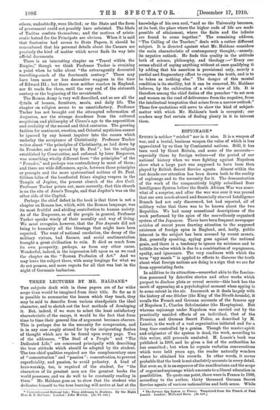THREE LECTUltES BY MR. HALDANE.* Tur subjects dealt with in
these papers are of far wider scope than would be imagined from their title. So far as it is possible to summarise the lesson which they teach, they may be said to describe from various standpoints the ideal character, and to sketch out the best methods of developing it. But, indeed, if we were to select the least satisfactory characteristic of the essays, it would be the fact that from time to time their general line of argument becomes obscure. This is perhaps due to the necessity for compression, and is in any case amply atoned for by the invigorating flashes of thought which :are to be found upon every page. Two of the addresses, "The Soul of a People" and "The Dedicated Life," are concerned principally with describing the true attitude which should be adopted by the student. The two chief qualities required are the complementary ones of " concentration " and " passion " : concentration, to prevent superficiality, and passion, to avoid pedantry. A kind of hero-worship, too, is required of the student, for "the characters of its greatest men are the greatest books the world possesses, and we do well to be constantly reading in them." Mr. Haldane goes on to show that the student who dedicates himself to the true learning will arrive at last at the
Universities and National Life: Three Addresses to Students. By the Bight Hon. It. B. Hallane. London: John Murray. [as. 61 net.] knowledge of his own soul, "and so the University becomes, at its best, the place where the higher ends of life are made possible of attainment, where the finite and the infinite are found to come together." The remaining address, "The Calling of the Teacher," deals with a rather different subject. It is directed against what Mr. Haldane considers the main characteristic of contemporary thought,—namely, its negative outlook. He finds this quality in the attitude both of science, philosophy, and theology :—" Every one seems afraid of saying anything without at once qualifying it by adding that his assertion is provisional only, merely a partial and fragmentary effort to express the truth, and is to be taken as nothing else." The danger of this mental condition is its sterility, but it can be removed, Mr. Haldane believes, by the cultivation of a wider view of life. It is therefore among the chief duties of the preacher "to set men and women on the road of deliverance from the negative, from the intellectual temptation that arises from a narrow outlook." These few quotations will serve to show the kind of subject- matter with which Mr. Haldane's book is occupied ; our readers may feel certain of finding plenty in it to interest them.






















































 Previous page
Previous page